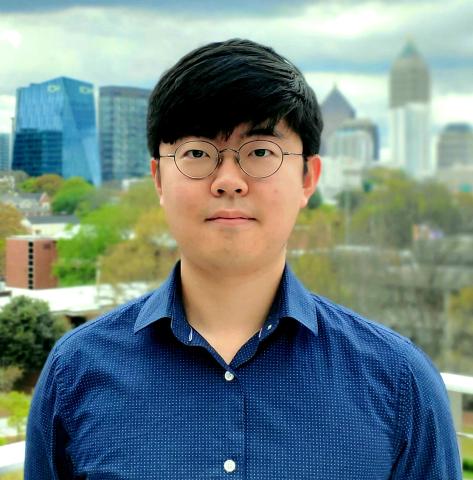ECE Ph.D. students Andrew Kim, David Munzer, and Adam Wang have been selected for National Defense Science and Engineering (NDSEG) Fellowships.
Three Ph.D. students from the Georgia Tech School of Electrical and Computer Engineering (ECE)–Andrew Kim, David Munzer, and Adam Wang–have been selected for National Defense Science and Engineering (NDSEG) Fellowships. The NDSEG fellowships are awarded to applicants pursuing doctoral degrees in, or closely related to, an area of interest to the U.S. Department of Defense.
The title of Kim’s project is "All-Optical Modulation of Dielectric Metasurfaces through Hot Electron Injection."His research project aims to develop high-Q optical devices by combining metallic and dielectric nanostructures that can tailor light in an extremely short timescale (pico to sub-pico seconds) for which light is controlled by a device using another light signal. If successful, his work will lead to a wider usage of optical circuits in replacement of conventional electronic circuits which are fast and efficient due to reduced heat generation and interconnect delay. Kim anticipates that the giant on/off ratio and large degree of freedom in controlling light (in amplitude, phase, and nonlinear signal generation) can make the device a building block for novel optical devices for optical logic circuits, quantum computing, and display systems. Kim’s adviser is ECE Associate Professor Wenshan Cai, and he has worked in the Cai Lab since August 2017. Kim graduated with his bachelor of science degree in integrated information technology from Yonsei University in Korea.
The title of Munzer’s project is "Wideband Mm-Wave Mixed-Signal Doherty Transmitter in GaN with Artificial Intelligence (AI) Assisted Rapid Reconfiguration and Performance Optimization for Dynamic/Harsh Environments.” This work takes advantage of analog power amplifiers (PAs) inherent linearity and large dynamic range with digital PAs large amount of reconfigurability. This design architecture allows the PA to achieve both linearity and efficiency enhancement simultaneously. Using gallium nitride (GaN), which offers exceptional power density and efficiency, will only further demonstrate the achievable performance with this architecture. This project is a natural extension of the Georgia Tech Electronics and Micro-System (GEMS) Lab's recent International Solid-State Circuits Conferencesubmission, which was a mixed signalDoherty transmitter for a CMOS platform. Munzer has worked in the GEMS Lab since 2018, where he is advised by ECE Associate Professor Hua Wang. He graduated with his bachelor of science degree in electrical engineering from the University of Florida.
The title of Adam Wang’s project is “A Self-Powered Hybrid Bacteria-Nanoelectronic Sensor System for Massively Deployable Environment Monitoring.” Also advised by ECE Associate Professor Hua Wang, Adam proposes a hybrid bacteria-nanoelectronic sensor system that optimizes energy-harvesting from engineered exoelectrogenic bacteria and uses them as fuel-cell batteries to power micro-Watt Internet-of-Things (IoT) devices or massively-deployable sensor networks in the field or in an aqueous environment. The results from Adam’s research could support many defense applications such as self-sufficient, large-area biosensing applications for detecting biowarfare agents; wireless communication networks in the sea or in the field; environmental monitoring applications such as detection of pollutants, heavy metals, or bombs; and bacteria-based energy harvesting. This work is an extension of Hua Wang’s current Office of Naval Research program and his collaboration with the Molecular Foundry at Lawrence Berkeley National Laboratory. Adam has been a member of the GEMS Lab since August 2017. He earned his bachelor of engineering degree, summa cum laude, with majors in electrical engineering and mathematics from Vanderbilt University.
Additional Images


